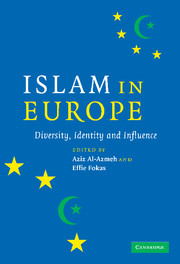Book contents
- Frontmatter
- Contents
- List of figures
- List of contributors
- List of abbreviations
- Preface
- 1 Introduction
- 2 Christians and Muslims: memory, amity and enmities
- 3 The question of Euro-Islam: restriction or opportunity?
- 4 Muslim identities in Europe: the snare of exceptionalism
- 5 From exile to diaspora: the development of transnational Islam in Europe
- 6 Bosnian Islam as ‘European Islam’: limits and shifts of a concept
- 7 Islam in the European Commission's system of regulation of religion
- 8 Development, discrimination and reverse discrimination: effects of EU integration and regional change on the Muslims of Southeast Europe
- 9 Breaching the infernal cycle? Turkey, the European Union and religion
- 10 Afterword
- Index
- References
1 - Introduction
Published online by Cambridge University Press: 05 June 2012
- Frontmatter
- Contents
- List of figures
- List of contributors
- List of abbreviations
- Preface
- 1 Introduction
- 2 Christians and Muslims: memory, amity and enmities
- 3 The question of Euro-Islam: restriction or opportunity?
- 4 Muslim identities in Europe: the snare of exceptionalism
- 5 From exile to diaspora: the development of transnational Islam in Europe
- 6 Bosnian Islam as ‘European Islam’: limits and shifts of a concept
- 7 Islam in the European Commission's system of regulation of religion
- 8 Development, discrimination and reverse discrimination: effects of EU integration and regional change on the Muslims of Southeast Europe
- 9 Breaching the infernal cycle? Turkey, the European Union and religion
- 10 Afterword
- Index
- References
Summary
It is a daunting task to introduce a text on this subject today, given the rapid pace of change surrounding Islam in Europe. The vast dimensions of this change defy simple summary and necessitate new, continuous and multifaceted research. By contrast, it is all too easy to list developments that have saturated print and electronic media coverage of Islam and of Muslims – even if only superficially related to the latter. The list ranges from examples of extremism such as the killing of Theo van Gogh and the Madrid and London bombings, to controversies pivoting on Islam, such as the eruptions following the printing of the cartoons of Mohammed in the Danish Jyllands-Posten and the reprinting elsewhere (aftershocks continue to be felt in the form of intense debates on free speech versus blasphemy, or versus religion, or versus Islam, depending on the interlocutor's perspective), and following Pope Benedict XVI's denigrating words on Islam in his Regensburg University speech. Meanwhile, also contentious have been plans for the subjection of immigrants to ‘citizenship tests’ aimed at assessing whether their values are compatible with those of the majority community. The Dutch example is the most poignant, suggesting little tolerance for immigrants who do not embrace Dutch values of tolerance, and raising further debate on whether ‘some values are better than others’. International press reports also bring to light national-level debates, such as controversy over the ‘identity soup’ served in soup kitchens in France to the exclusion of Muslims (and Jews), renewed disputes regarding the wearing of headscarves in public schools, and tensions concerning the building of mosques (most acute in France, Italy and of course Greece).
- Type
- Chapter
- Information
- Islam in EuropeDiversity, Identity and Influence, pp. 1 - 15Publisher: Cambridge University PressPrint publication year: 2007
References
- 1
- Cited by



